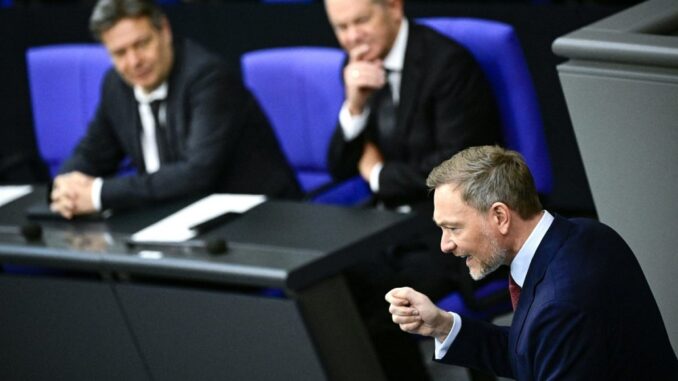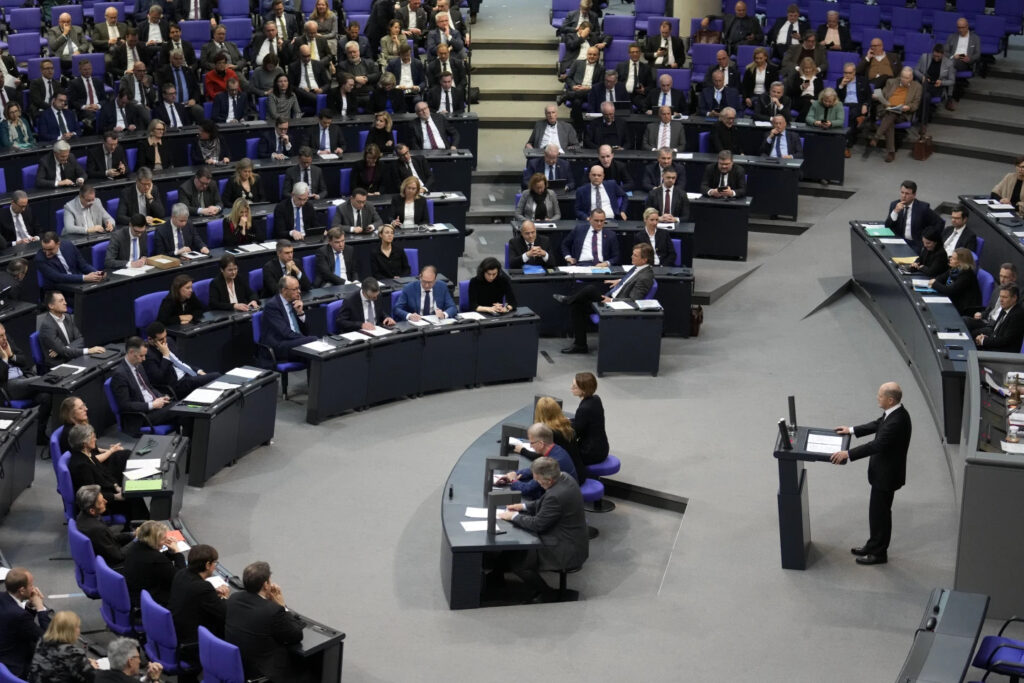
After weeks of discussions, the lower house finally reached an agreement for the 2024 federal budget. The roadmap: cuts in fundamental areas such as Health and Climate Protection, increase in the price of CO2 and the gradual elimination of tax advantages for agricultural diesel, among other adjustment measures. For the first time since the pandemic, the debt brake will be maintained, which limits it to 0.35% of GDP.
By Carolina Menéndez Trucco
Saving today could cost dearly tomorrow. The “traffic light government” austerity policy aims to achieve fiscal balance, but cuts that ease balances can have serious long-term social and climate consequences. “There can be no question of clear-cutting”, the finance minister, Christian Lindner, had assured at the beginning of the negotiations. But the road to the 2024 federal budget, from draft to final decision, was long and ultimately left several holes unfilled. Although the level of social spending will be maintained in principle and the funds allocated to the area increased compared to the previous year, including benefits that generated arduous debates such as citizen’s benefit, there were on the other hand, important cuts in Health and Climate Protection and there may be more. Citizen’s benefit may not increase next year, and tax subsidies for pension and healthcare insurance could be cut. In other words, the government ended up adjusting a little less than expected, even at the expense of criticism from the Christian Democratic opposition that accused it of not saving adequately.
“This coalition has a design ambition. I am therefore not talking about an austerity budget, but rather a design budget”, said the finance minister in his speech in the Bundestag, defending the direction that the FDP liberal along with his traffic light coalition partners added to the financial plan after several months of debates. Normally, the federal budget is decided in December of the previous year. But this time several potholes first had to be filled after the Federal Constitutional Court declared the use of coronavirus loans for climate projects (the so-called Climate and Transformation Fund) unconstitutional. Rarely has a federal budget been discussed so intensely, and all this within the framework of the debt brake that limits indebtedness to 0.35% of GDP coming into effect for the first time since 2019. How will the 476.8 billion euros allocated to spending and the 39 billion euros of loans planned for the remainder of 2024 finally be used?
The adjustments
The SPD, the Greens and the FDP[1] agreed on a savings program that includes, among other things, a higher tax on airline tickets, a higher CO2 price and the phasing out of tax advantages for farmers despite the protests that took place for weeks throughout the country. These measures will be implemented in a separate law, which still needs to be approved by the Federal Council. State funding for electric cars that expired last year will not be resumed. Citizens’ benefit and other social assistance hang by a thread. In mid-January, Lindner had already announced that the so-called climate money, social aid to compensate people with fewer resources due to the increase in the price of CO₂, could not be delivered before the end of the next electoral period as promised. As if that were not enough, the brakes will no longer be applied to the prices of electricity and gas, which will weigh on the pockets of those who have the least.
On the other hand, the most significant adjustments compared to the previous year are in the Ministry of Health according to the government, due to the elimination of large Coronavirus expenses. The budget went from 24,483 to 16,221 million euros from 2023 to 2024. The budget financing law also included cuts in numerous projects of the Ministry for Economic Affairs and Climate Action, which fell from 14,568 to 10,995.
“Design ambition”
There are no taxes for the super-rich or cuts in the army, but increases in VAT for restaurants and in CO2 prices that especially affect the poorest, and other adjustments, especially in essential sectors such as Health and Climate Protection: that is the core of the “traffic light” budget agreement. The defense budget amounts to about 52 billion euros, plus billions in “special funds” for the Bundeswehr (the German armed forces). The increase in the CO2 tax will probably increase the prices of gasoline, diesel and gas, which may also be passed on to electricity, as a result of the cancellation of federal subsidies for network tariffs, which until now alleviated the burden of the homes. For several specialists, given the importance of energy prices, this could in turn have an impact on inflation.
But the finance minister is convinced of his plans. The FDP politician referred to record investments of 70.5 billion euros, for example in railways, roads and networks. At the same time, he defends that the tax rate for the population is falling. In the end, the credit for budget consolidation basically went to reducing debt levels. After the intense cuts, the balances of the Health and Climate sector remain pending, two fundamental areas with long-term impacts.
In short, it is a budget that does not adjust the pockets of the capitalists, but ends up being harmful to the German working people. In short, it is a budget that does not affect the pockets of the capitalists, but ends up being harmful to the German working class.
[1] Social Democratic Party of Germany (SPD) since December 2021, presides over the federal government with Chancellor Olaf Scholz, with Alliance 90/The Greens and the Free Democratic Party (FDP) as coalition partners.









